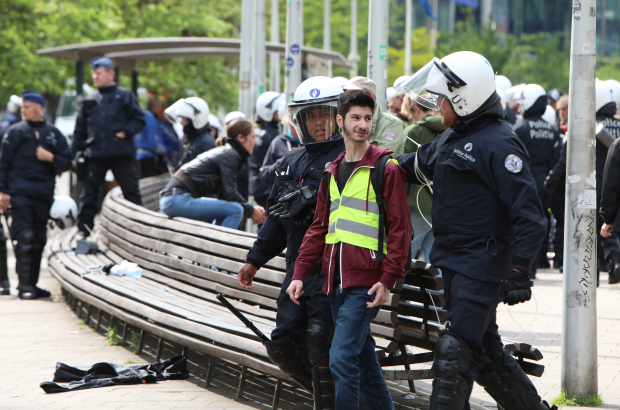- Daily & Weekly newsletters
- Buy & download The Bulletin
- Comment on our articles
New report highlights tensions between young people and police
A new report published by the Youth Forum shines a light on the growing tensions between young people and the police.
In its opening statement, the report, based on an extensive survey conducted between March and May 2020 among 1,408 people aged between 16 and 30, in Wallonia and Brussels, says that "there is little doubt that there is friction between young people and the police".
"The current health situation has made relations between young people and the police even more complicated," the Forum’s report noted. "A combination of unpleasant factors and unnecessary provocations over the summer - a period during which, traditionally, young people want to be outside - has not helped to soothe relations."
The organisation calls for "a concerted effort and time of reflection between political actors, police officers, social actors on the ground and, of course, young people."
The report, which draws on the reflections of interviewees from various backgrounds, documents many complaints from young people regarding their interaction with the police.
First, 31% of respondents indicated that they had been stopped by police officers while on the streets. Seven out of 10 young people interviewed condemned "police checks that systematically target young people." The report says that "some young people speak of discrimination and many regret a state of affairs that can only harm relations.”
The organisation also asked these young people how they felt when they saw a street patrol. The first answer was that it made them feel secure. Then, they said they felt fear and then respect; followed later by anger. "This order is very revealing,” the report notes. “Respect comes in third place: even if it shortly after, it follows on from a feeling of fear, which is enough to indicate that an overall reflection on the relationship between young people and the police is essential." The survey showed that negative feelings increase sharply with age. Fear is cited by 24% of respondents aged 16 to 18, but 46% of 24-30-year olds.
On the subject of violence, respondents felt that those officers guilty of stepping over the line should be clearly and heavily punished. "As long as young people feel that there is impunity for deviant police officers, positive messages will continue to fall on deaf ears."
In addition, participants believe that for a state to remain democratic, the police must be monitored by citizens and in particular by civil society actors. "Many believe that the police cannot control themselves."
Only 18% of young people surveyed feel that they are well informed about their rights and duties and most want to be more so. For these young people, this should be the role of the school and the police itself.
The Youth Forum highlights the important role of the Philosophy and Citizenship Course in bridging this knowledge gap. "As for bringing the police to schools, the idea is often stated, but on the condition that these visits are carefully prepared with the young people," the report says.
One of the laws where there appears to be a lack of knowledge is the SAC law on municipal administrative sanctions. The SAC law allows an administrative fine to be imposed on over-14s who commit offences; for example, for shaking carpets out of a window, for vomiting in the street or for ringing doorbells.
Situations such as these are punishable by fines of up to €350 for adults and €175 for minors. The Youth Council has already mentioned many times that this law is little known to young people. The survey figures confirm this: 70% of respondents do not know what the SAC law is. And almost 50% denounce a system of fines whose scope and interest are zero. "More worryingly," the Forum stresses, "young people have testified to the fact that, in some vulnerable families, they are forbidden to leave the house by their parents who fear their children will receive a SAC fine that they would be unable to pay."
To improve relations with the police, the young people interviewed offered their own proposals. "First there is a massive call for more mutual respect," the report said. This call goes hand in hand with the desire for more empathetic communication on the part of the police. "Talk before using the handcuffs," said one respondent.
Respondents also expressed a desire to increase the interactions between young people and police officers. " Some concrete initiatives are even proposed, such as role-playing between young people and police students in police academies," the report said.
Finally, on the basis of this consultation and work, the Youth Forum has also issued a plea, calling for, among other things, a review of police training "oriented towards better management of relational and human aspects" and the removal of minors from the scope of the Law on Municipal Administrative Sanctions (SAC).



















